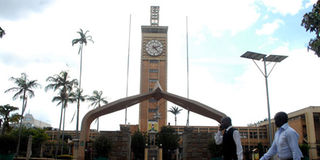Ministers ordered to resign before taking up new jobs

PHOTO | FILE Parliament Buildings. Cabinet ministers will lose their posts once they are sworn in as senators, MPs or governors.
What you need to know:
- Kibaki orders 22 Cabinet members and 19 assistants who won in the March 4 polls to resign immediately before they can qualify to take up new positions as governors, senators or MPs
Twenty two ministers are set to lose their Cabinet positions before they are sworn in as senators, governors or MPs. (Read: Picking Cabinet next challenge for Jubilee leadership)
Also to quit their posts are 19 assistant ministers who will be sworn in for various seats in ceremonies scheduled for next week.
On Tuesday, President Kibaki directed ministers and assistant ministers elected on March 4 to resign, “with immediate effect, so as to qualify to be sworn in” for various elective posts.
In a letter to all ministers and assistant ministers, Mr Francis Kimemia, the head of the civil service, said those who had not been elected to any position remain in office “until the swearing-in of the President and appointment of the new Cabinet Secretaries”.
Of the 22 ministers, 19 have been elected either as senators or MPs. Two others, Mr Wycliffe Oparanya and Mr Amason Kingi (the Planning and Fisheries ministers respectively) have been elected as governors for Kakamega and Kilifi respectively.
Of the assistant ministers, Mr Josphat Nanok (Turkana); Sospeter Ojamoong (Busia) and Peter Munya (Meru) have been elected governors. The other nine have been elected MPs or senators.
From Coast, those who will lose their Cabinet positions besides Mr Kingi are Gender Minister Naomi Shaban, who was re-elected Taita-Taveta MP and Mr Gonzi Rai, the assistant minister for Lands who was also returned as Kinango MP.
Also to be affected is assistant minister Ali Hassan Joho, who was elected Mombasa governor.
Section 77 (1) of the Constitution says “a full time state officer shall not participate in any other gainful employment” while Section 152 (3) says “a Cabinet Secretary shall not be a member of Parliament”.
Incoming leadership
Last week, attorney-general Githu Muigai said in a legal opinion that Cabinet ministers will lose their positions immediately they are sworn in as MPs, senators or governors.
“An individual member of the Cabinet may lose the right to remain in office in the event that the Cabinet member is subsequently elected and takes oath of another office,” the AG said in a letter to Mr Kimemia.
Cabinet Secretaries will be appointed by the in-coming leadership following the March 4 election. (Read: Cabinet to be made up of 22 ministries)
On March 9, the Independent Electoral and Boundaries Commission (IEBC) declared Mr Uhuru Kenyatta of the Jubilee Coalition winner of the presidential election. He and his running mate, Mr William Ruto — now the Deputy President-elect — had a pre-election agreement on how they would share out Cabinet positions after winning the election.
However, the Cord presidential candidate, Mr Raila Odinga, has filed a petition in the Supreme Court challenging IEBC’s decision to declare Mr Kenyatta and Mr Ruto as the winners. The court is expected to give a ruling on the case by April 6 — two days after the deadline for convening the first sitting of the incoming Parliament.
The court has its first sitting for the mention of the case on Wednesday morning.
From Eastern Province, the Cabinet ministers set to lose their seats are Mr Mutula Kilonzo (Education), who is the senator-elect for Makueni and Energy Minister Kiraitu Murungi, the senator-elect for Meru.
In Central, Special Programmes Minister Esther Murugi, who is now the Nyeri Town MP, is also set to lose her seat as will Nairobi Metropolitan Minister Jamleck Kamau, who was re-elected Kigumo MP.
In North Eastern, those to be affected are Defence Minister Yusuf Haji, who is now Garissa senator-elect; Mohammed Kuti (Isiolo senator) and Mohammed Elmi, the North Eastern Development Minister.
In Nyanza, those to lose Cabinet posts include James Orengo, Anyang’ Nyong’o, Otieno Kajwang’, and Chris Obure, who have won senate seats in Siaya, Kisumu, Homa Bay and Kisii respectively.
Those affected in Western are Moses Wetang’ula (Bungoma senator) and Ababu Namwamba and Paul Otuoma, who retained their MP seats.
In Rift Valley, Mr John Munyes (the senator for Turkana) and Mr Katoo ole Metito stand to lose their seats.
The law requires Parliament to be convened within 30 days after the declaration of election results.
The 11th Parliament — the first under the 2010 Constitution — is expected to convene on or before April 4. Parliament and the Office of the President met on Monday and agreed on March 28 as the appropriate date for the first sitting of the bicameral Parliament.
Reported by Njeri Rugene, Emeka-Mayaka and Edith Fortunate




